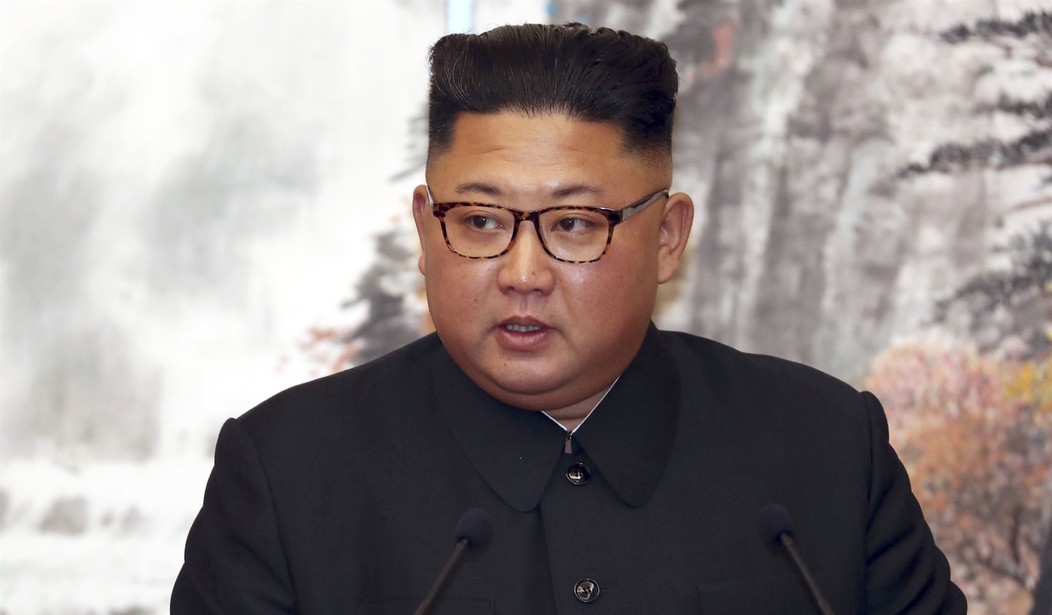Kim Orders Military to 'Thoroughly Annihilate' United States and South Korea if Provoked
North Korean dictator Kim Jong Un is continuing his saber-rattling with a new development in which he made threats against the United States and South Korea. On Monday, he instructed North Korea’s military to “thoroughly annihilate” both countries if they provoke the North Korean regime.
This rhetoric, supported by state-owned media, is part of a broader war of words between the countries.
North Korean leader Kim Jong Un said his military should “thoroughly annihilate” the United States and South Korea if provoked, state media reported Monday, after he vowed to boost national defense to cope with what he called an unprecedented U.S.-led confrontation.
North Korea has increased its warlike rhetoric in recent months in response to an expansion of U.S.-South Korean military drills. Experts expect Kim will continue to escalate his rhetoric and weapons tests because he likely believes he can use heightened tensions to wrest U.S. concessions if former President Donald Trump wins the U.S. presidential election in November.
In a five-day major ruling party meeting last week, Kim said he will launch three more military spy satellites, produce more nuclear materials and develop attack drones this year in what observers say is an attempt to increase his leverage in future diplomacy with the U.S.
In a meeting Sunday with commanding army officers, Kim said it is urgent to sharpen “the treasured sword” to safeguard national security, an apparent reference to his country’s nuclear weapons program. He cited “the U.S. and other hostile forces’ military confrontation moves,” according to the official Korean Central News Agency.
On Thursday, Kim made similar comments when he pushed to expand its war preparations.
North Korea leader Kim Jong Un has ordered his country's military, munitions industry and nuclear weapons sector to accelerate war preparations to counter what he called unprecedented confrontational moves by the U.S., state media said on Thursday.
Speaking on the policy directions for the new year at a key meeting of the country's ruling party on Wednesday, Kim also said Pyongyang would expand strategic cooperation with "anti-imperialist independent" countries, news agency KCNA reported.
North Korea has been expanding ties with Russia, among others, as Washington accuses Pyongyang of supplying military equipment to Moscow for use in its war with Ukraine, while Russia provides technical support to help the North advance its military capabilities.
The first question that comes to mind is: Can North Korea actually make good on Kim’s orders? The regime has been progressively advancing its nuclear arsenal. Estimates indicate it has between 20 to over 100 bombs. But the issue is whether or not the regime could reach the United States with these warheads. This has not been the case in the past, but there could be indications that North Korea’s capabilities have improved.
The Hwasong-18 missile’s physical dimensions and its flight trajectory data appear “nearly identical” to those at of Russia’s Topol-M ICBM, says the report, authored by Theodore A. Postol, a professor emeritus of science, technology and national security policy at the Massachusetts Institute of Technology. The report was written for Beyond Parallel, a project sponsored by the Center for Strategic and International Studies, a defense think tank.
The new missile represents a sudden and significant advancement of North Korea’s ballistic missile arsenal, according to North Korea’s own pronouncements confirmed by U.S. officials. The rocket is solid-fueled, making it harder for Western intelligence to detect than liquid-propellant ICBMs. The test last month, observed by North Korean leader Kim Jong Un, was the first successful launch of a solid-fueled ICBM. The test also demonstrated the Hwasong-18’s ability to deliver multiple thermonuclear warheads as far as Washington, the report said, and deploy decoy canister countermeasures to evade U.S. missile defenses.
If this report is accurate, then North Korea might be closer to obtaining the capability to strike the United States. However, this does not necessarily mean such a move would be successful, nor is it likely that Kim wants this outcome, given the retaliation that would come. It seems more likely that he is seeking to use this as leverage to gain concessions from the U.S. and other nations.
North Korea has increased its warlike rhetoric in recent months in response to an expansion of U.S.-South Korean military drills. Experts expect Kim will continue to escalate his rhetoric and weapons tests because he likely believes he can use heightened tensions to wrest U.S. concessions if former President Donald Trump wins the U.S. presidential election in November.
Given Trump’s meetings with Kim during his presidency, it is not surprising that the North Korean leader would want more leverage in the event that Trump does become president again. It is also worth noting that another Trump presidency might make Kim more hesitant to rattle the saber given the former president’s unpredictability and willingness to threaten “fire and fury.”
The international community will face a complex challenge ahead with North Korea regardless of who wins the 2024 election. North Korea’s threats are part of a longstanding pattern of aggressive rhetoric and missile tests. As the election draws closer, the world will be waiting to see what comes next.





Post a Comment